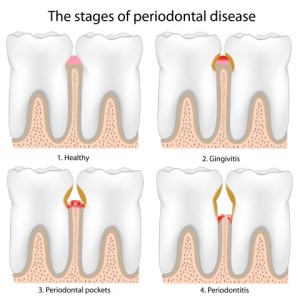 Gum disease is a common oral health condition that affects a large percentage of the population in the United States. Advanced periodontal (gum) disease can affect the success rate of dental implants – especially if the condition has eroded bone or gum tissue. Having healthy bone mass and gum tissue are important support structures for an implant. Fortunately, patients with gum disease have treatment options to increase the likelihood of an implant’s success rate and improve damage caused by periodontal disease.
Gum disease is a common oral health condition that affects a large percentage of the population in the United States. Advanced periodontal (gum) disease can affect the success rate of dental implants – especially if the condition has eroded bone or gum tissue. Having healthy bone mass and gum tissue are important support structures for an implant. Fortunately, patients with gum disease have treatment options to increase the likelihood of an implant’s success rate and improve damage caused by periodontal disease.
How does gum disease affect oral health?
Gum disease can be especially problematic in its advanced stages. In fact, many patients are surprised to learn that gum disease is actually the leading cause of tooth loss in adulthood. The reason periodontal disease affects oral health in such a profound way is the fact that it separates teeth from their supportive structures (bone mass and gum tissue). When tartar buildup accumulates along the gum line, it will infect periodontal tissue and cause gums to recede from teeth. Over time, especially if bone is affected, teeth will become loose because they lack support. Without proper treatment, teeth will eventually fall out. Additionally, research has shown a link between periodontal disease and other health conditions such as cardiovascular disease, diabetes, and stroke.
I’ve lost a tooth, are dental implants still an option with gum disease?
In the past, most patients with advanced gum disease were not eligible for receiving dental implants. This was because of lost gum tissue and bone mass caused by periodontal disease. Today, however, patients have more options. Patients with periodontal disease typically require deep prophylaxis to clean away the infection and if tissue loss is present, patients will likely need bone and/or gum grafts to reconstruct lost tissue. These procedures, along with a commitment to a meticulous oral hygiene regimen can greatly increase an implant’s success rate. Additionally, because dental implants are made of titanium, the oral bacteria that cause cavities and gum disease cannot damage them.
The only way to be certain that dental implants are right for you is to schedule a consultation with our experienced team of oral surgeons. Contact Oral Surgery Associates of North Texas today to book an appointment.

Comments are closed.